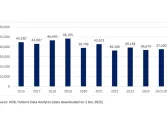
Singapore beats the US as the largest source of real estate investments in APAC
Property investors from Singapore injected nearly US$8.5b into the region.
Singapore has emerged as the primary source of Asia-Pacific (APAC) real estate investments year-to-date, surpassing the United States (US) for the first time. Singapore investors injected nearly US$8.5 billion into APAC real estate, according to findings* by Knight Frank. This brings Singapore's cross-border investment value to surpass that of the US by nearly 50%.
Neil Brookes, Global Head of Capital Markets at Knight Frank, said, “Many private offices and government linked companies in Singapore retain significant equity ready to be deployed. The wider market dislocation caused by rapidly increased borrowing costs creates opportunities for all equity investors to deploy capital while many other institutional investors are sitting on the sidelines. The strength of the Singapore dollar is also driving large institutions such as GIC and other Government-Linked Companies to pursue opportunities in markets such as Japan, China, South Korea, and Australia. Notably, GIC has consistently increased its allocation to the real estate asset class, with investments in the US now accounting for approximately 22.4% of the total inbound investment volume from Singapore.”
Increased interest in new economy class assets
APAC’s commercial real estate market saw limited movement in the third quarter of 2023, with investment activity contracting 53.4% year-on-year. The discernible pullback from domestic and international investors underscores their reluctance to invest in the current high-interest rate environment, in which yield spreads have narrowed to a certain extent that certain markets are experiencing negative risk premiums.
In response to these challenges, APAC investors have shifted their focus to new economy assets, particularly in the industrial and data center sectors. Meanwhile, the acquisition of office spaces has taken a backseat, reflecting the persistently challenging business sentiment and a weak return-to-office movement.
Christine Li, head of research Asia-Pacific, said, “In response to these challenges, a growing portion of cross-border capital from APAC has been directed towards new economy assets such as industrial properties and data centers. For industrial properties, the combination of limited supply of institutional-grade assets and sustained long-term demand from e-commerce, life science and technology are fueling investment interest. Similarly, the data center sector is increasingly viewed as a stable, long-term investment opportunity.”
Canada attracted the largest share of APAC outbound investments, surpassing the US for the first time
For the first time, APAC outbound investments into Canada exceeded those directed towards the traditionally favoured investment destination, the US. Canada secured a significant 42% share of APAC outbound investments, with the UK following at 26%, and Germany at 10%. This shift was accompanied by an eighteenfold increase in deal volumes from APAC to Canada, reaching US$1.02 billion, primarily driven by investments in data center portfolios.
Ms Li adds, “APAC investors to seek opportunities beyond US. The deviation from US could be a bid to diversify against rate headwinds in the world's largest economy. While worries about the US regional banking industry have eased, banks generally report tighter lending conditions. Among APAC investors, Japan led the way in terms of investments in Canada, accounting for 43% of the total investment volume in the third quarter. The largest investor was KDDI, a telecommunications company, which acquired three data centers in Toronto, Canada, amounting to US$1.02 billion. This transaction also stands as the largest made by a Japanese investor in Canada. Singapore came in second, contributing 37% to the total volume for the quarter, primarily due to GIC's involvement in several industrial transactions in Germany.”
*Based on data from Real Capital Analytics (RCA), as of 20 October 2023
For the full report, click here.



















 Advertise
Advertise




